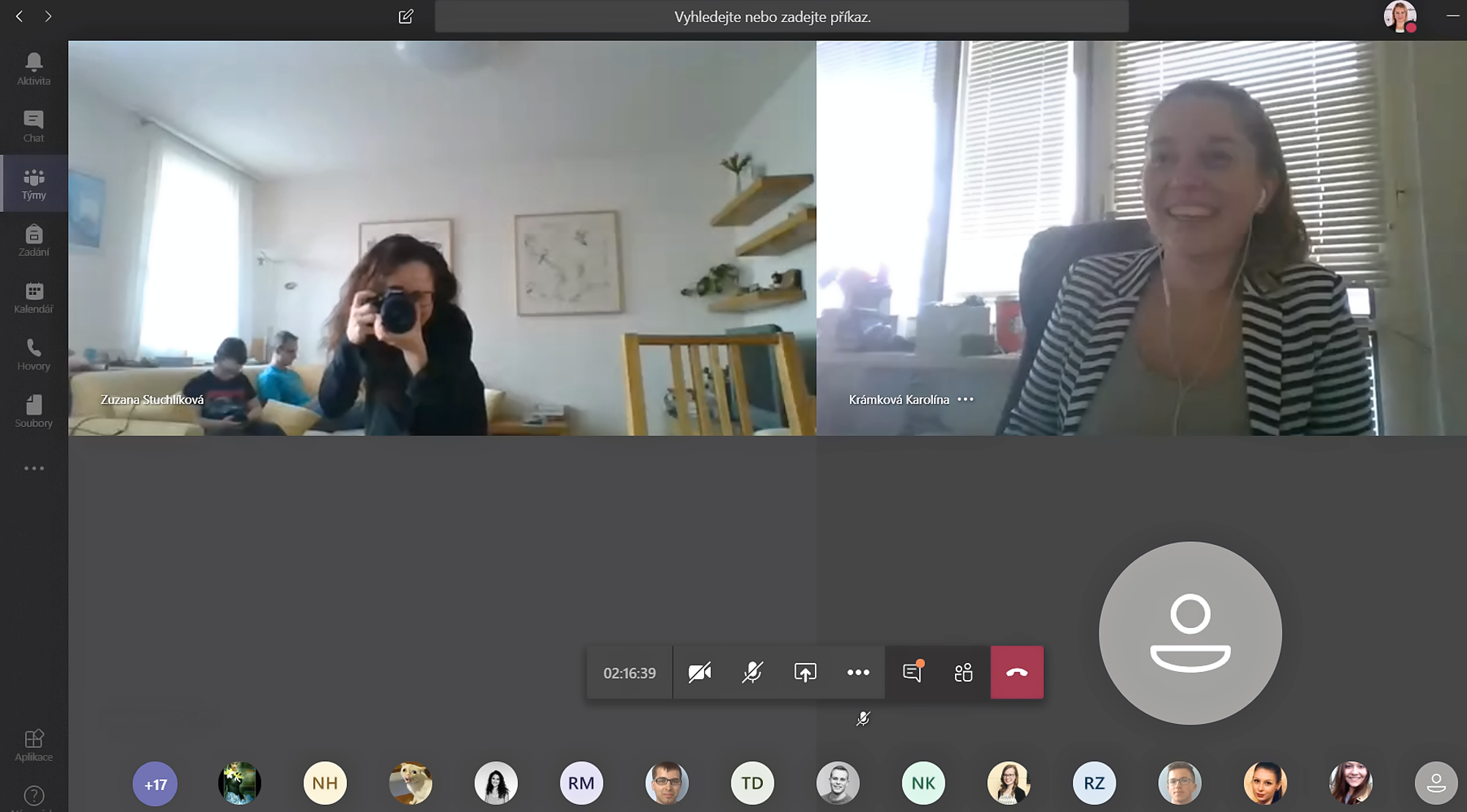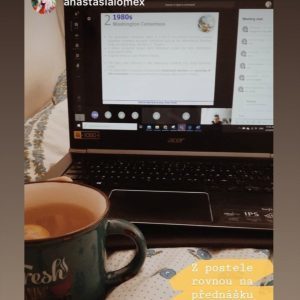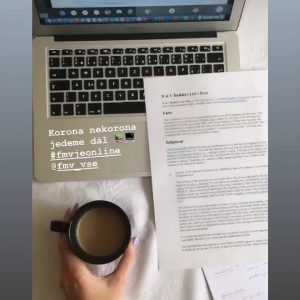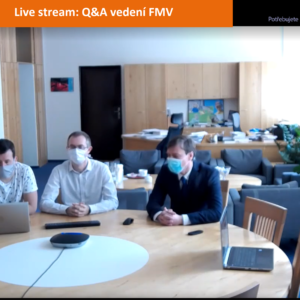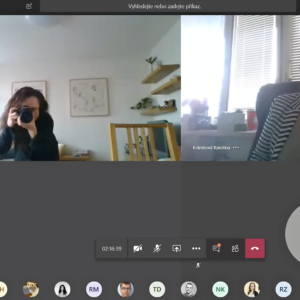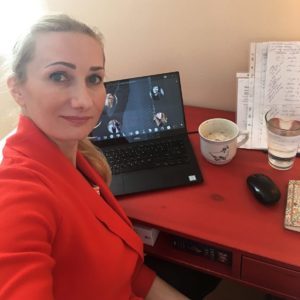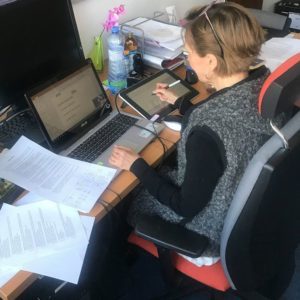“The lectures are interactive, the examples are solved on a tablet and a whiteboard, and questions from the chat are answered.” FIR has been teaching online for over a month.
Following emergency measures, FIR switched to online teaching in mid-March. What was the transition from offline like for students and teachers? How do virtual lectures and exercises work? And what do they miss the most? We asked two teachers and three students from the Faculty about it.
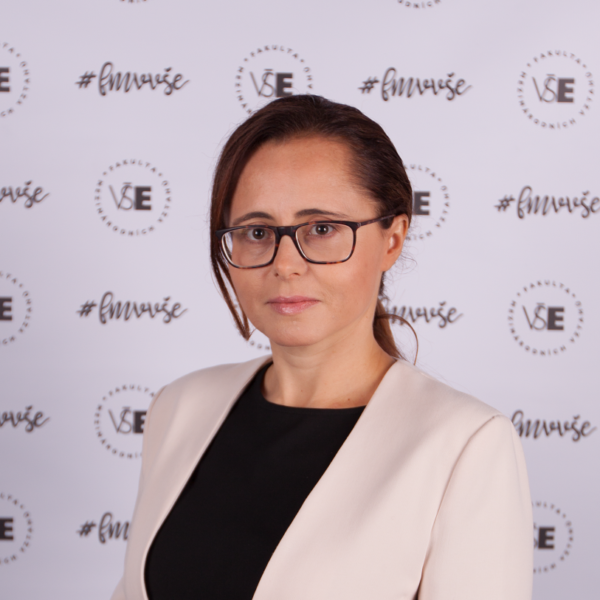
Assoc. Prof. Zuzana Stuchlíková
“Even though it was quite challenging from the beginning, I was happy with the quick transition of regular teaching to Teams. I was glad that we kept going and the students didn’t have to interrupt their studies or study everything themselves. Not all universities have succeeded in that! ”Says doc. Zuzana Stuchlíková.
“However, I really miss students at this stage of the semester, I lack personal contact and work in teams. Working at Teams is nice, but it also has its limitations, including, for example, that some students are still a little ashamed and do not want to show up for the camera. On the contrary, a cat sometimes passes in front of my camera, a ten-year-old son and other unexpected elements join the discussion. I am starting to look forward to state examinations and exams, which should already take place in relative calm, on the premises of the University of Economics, “adds doc. Stuchlíková.

Ing. Radek Čajka, PhD
“The transition to online teaching was a great and interesting challenge for me, as well as for other colleagues, “says the Vice-Dean for International Relations and PR and a member of the Department of International Trade, Ing. Radek Čajka, PhD.
“It made me think about the way we’ve been used to teaching so far, and which, in a sense, will probably never come back. I need to be able to use the newly acquired knowledge and skills in the normal teaching regime, “he continues.
“I am glad that the current situation also provided me with the opportunity to use the manual skill when I made a construction myself, which allows me to stream calculations performed on classic paper over the phone. I’m proud of that and I think that students appreciate the way. However, it is necessary to admit that although online teaching has a certain charm, I very much lack direct contact with students, at least in terms of obtaining feedback, “he concludes.
Eliška
“I am in the third year in the last semester and I have enrolled only a few subjects, but all the subjects I have very quickly switched to the online version,” says Eliška, a student of International Trade.
“Online language teaching works well. We have more homework and preparation for exercises, where we will check the tasks and go through the ambiguities. At the beginning of each lesson, the teacher prepares a short presentation in which we practice grammar, articles or prepositions. In the next language subject (conversation), at the beginning of the online exercise, each student presents a short topic or topicality that he/she has prepared, followed by discussions and questions from classmates, and then teaching takes place in a similar way as in the first case, ”Eliška continues.
“All teachers are extremely accommodating and try to mediate online teaching as best they can. I liked the Dean’s Q&A, in which students had the opportunity to ask anything they were interested in studying and the current situation, “he concludes.
Marek
“I have to commend FIR for being the first of my subjects enrolled in this semester to run online with Teams without any problems. Specifically, International Economics 2, where lectures and exercises take place to maintain maximum interactivity. At seminars and lectures, we continuously add answers to the questions that are asked during the explanation, whenever we can ask anything, both in writing via chat and by voice, “adds Marek, a student of the 1st year of the master’s program. International trade.
“I also appreciate the dedication of teachers who are already older and with the latest technology often do not understand that they still teach without problems in Teams and try to replace full-time teaching as much as possible,” Marek continues.
Lan
“The lectures are as interactive as possible, for example, we go through the presentations in Teams with Dean Taušer, at the same time the examples are solved on the board and the teacher answers all questions that appear in the chat,” says Lan, a student of the last year of the International “For those who missed the lecture, the individual lessons are recorded, which will be useful in preparation for the final test. Dr Král, in the subject of International Marketing, tries to involve others in the discussion during the lecture and even gives points at the end of some lectures. “Practical guests are also scheduled for the next lectures.”
“I also have a team presentation for a joint project and I think that the Teams environment is suitable for presentations and works well. I also managed the consultation for the diploma thesis online with my supervisor and preliminary online defence of the qualification thesis is also planned, “continues Lan.
There was also an online Q&A meeting with the FIR management, Dean Josef Taušer and Vice-Deans for Pedagogy and International Relations and PR, who answered students’ questions about the current situation and organization of studies, exam and foreign trips. The entire record can be found on the intranet of FIR students.
Also, on the Faculty’s Instagram, you will find the call #FIRisonline, where students share how their lessons go. Coffee in hand and breakfast on the table, these are among the great benefits of online studios. Share with us how your home study is going and mark your contributions with the hashtag #FIRisonline!
On the Facebook page of the Department of World Economy, its teachers share their online experiences.
